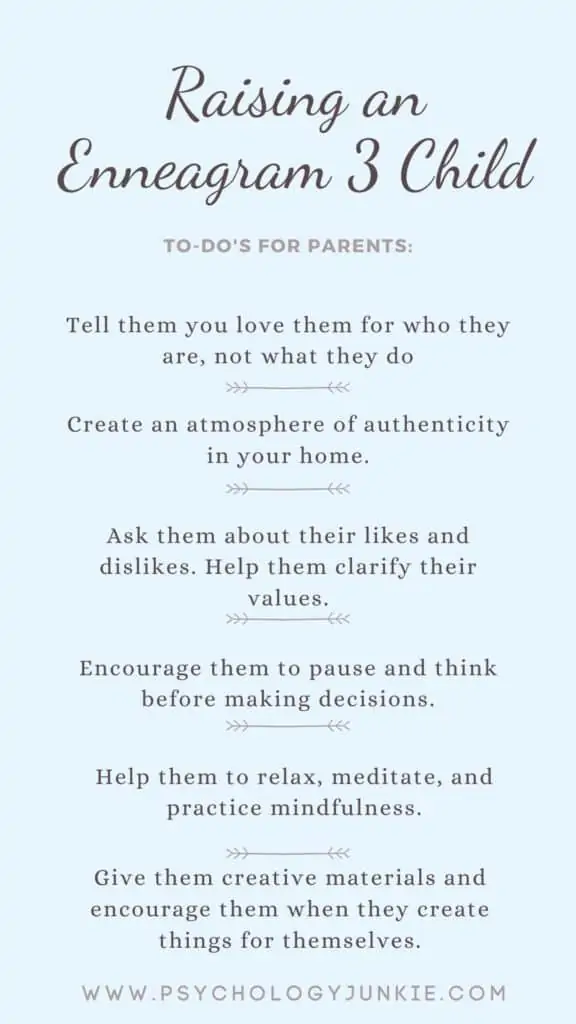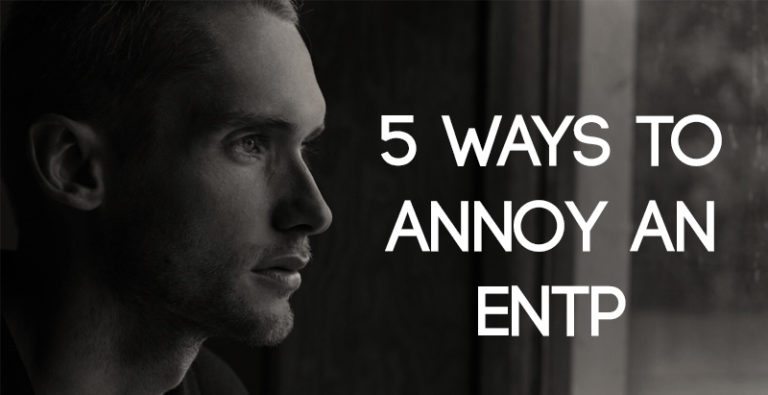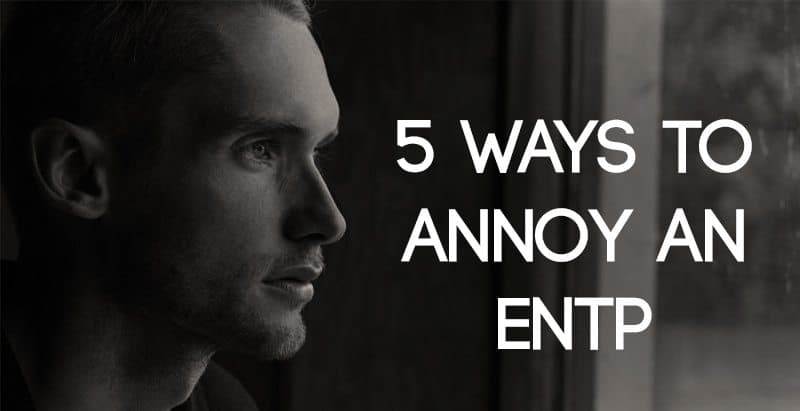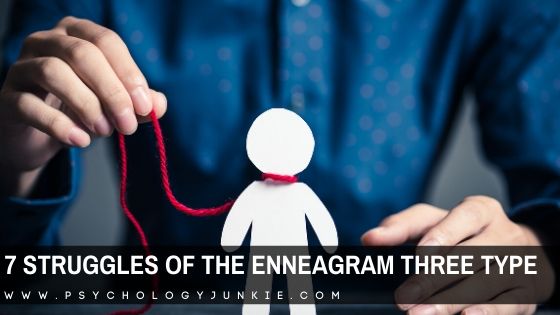The Enneagram 3 Child
Known as “The Achievers,” Enneagram Threes make an impact on the world through their ambition, charisma, and persuasiveness. Threes have a dauntless sense of determination, stopping at almost nothing to achieve their goals and make a name for themselves in the world. Mediocrity or failure is anathema to the Three. But what makes these types so ambitious and driven? What other characteristics are common with Threes? That’s what we’ll be exploring in today’s article!
Not sure what your Enneatype is? Take our free Enneagram questionnaire.

Table of contents
Estimated reading time: 6 minutes
An Overview of the Three Enneatype:
- Part of the Heart triad (along with Enneatypes 2 and 4)
- Can have a Two or Four wing (3w2 or 3w4)
- Ego fixation: Vanity
- Virtue: Authenticity
- Integrates to the Six (the Loyalist) under growth
- Disintegrates to the Nine (the Peacemaker) under stress
- Basic Fear: To be worthless or without value apart from achievements
- Basic Desire: To be worthwhile, desirable, and accepted
Signs That Your Child Might Be an Enneagram 3 Type:
- They have big dreams and goals for their life
- They know how to “read” people and the social scene
- They care about their appearance a great deal
- They are energetic and tend to take on too many tasks
- They have many skills and interests
- They like efficiency and moving rapidly towards their goals
- They appear confident and unflappable
- They are fairly practical for their age
- As soon as they accomplish one goal, they’ve thought of another
- They are competitive
- They want to impress people
- They are strong persuaders
- They get overwhelmed if they’ve made a bad impression
Strengths of the Enneagram 3 Child:
Determined and pragmatic, Threes are typically adept at making a good impression. They aim to achieve, which often means getting good grades, trying out job opportunities earlier in life than their peers, or competing in school sports. The area they channel their ambition into will vary from Three to Three. If they grow up in a politically passionate family they may aim for student government. If they live in a family that values sports, they may aim for mastery in football.
The practicality and persistence of the Three can give them a leg up in crisis situations. Threes are action-oriented and know that time is of the essence. It’s vital for them to channel their energy into something productive and profitable. Rather than moping when things don’t go their way, they are more than likely to find a different opportunity they can jump into.
At a healthy level, Threes are adaptable, outgoing, and realistic. They have a strong sense of the potential in any situation and can see opportunities where others see nothing but grim despair. In this sense, they can be an uplifting force in their social circle, finding ways to have fun and make the best of any situation.
At their very best, Threes are also authentic and modest. However, it usually takes a great deal of time for Threes to develop the maturity and personal growth needed to reach this point. It can be difficult for them to reveal their true selves, for fear of it not being “good enough.”
Because competence and achievement mean a great deal to Threes, they are usually:
- Well-mannered or charmingly rebellious
- On-time for school and self-motivated with homework
- Decisive and action-oriented
Struggles of the Enneagram Type 3 Child:
Because Threes are so driven by achievement, they tend to think that the pathway to love and acceptance is through success. This means that they can be incredibly competitive, even with siblings. Gaining approval satisfies their core desire of being worthwhile, desirable, and accepted. If other children take the limelight they may experience jealousy or insecurity – worrying that their place in the home is less certain or secure than it should be. In friendships, they may worry about their status. If new friends join their circle, they may worry about being dismantled as a valuable member.
This can show up in Threes bending over backward to serve others or bending over backward to impress their friends or family. As a result, they may lose sight of their core needs and overwork themselves into a state of exhaustion. This can also show up in exaggerated stories, or feeling the need to compete or “one-up” others in order to appear more competent, valuable, or funny.
Threes can appear arrogant, cliquey, and competitive or they can appear friendly, warm, and enthusiastic – it all depends on their maturity level, environment, and personal code of ethics.
Another struggle that Threes face is getting comfortable with the idea of vulnerability. If a young Three feels ashamed, afraid, or insecure, they may not know who to trust or talk to. If their family is not an open environment where people freely share about such things they will probably try to hide their vulnerabilities for fear of rejection or increased shame. This fear of vulnerability can grow until the Three turns into an adult who can’t be honest about his or her feelings with other people and has to keep striving and competing to feel valued. Unfortunately, this feeling of value never really matters in the long run, because they wonder if they’re valued for who they are or what they accomplish.
Tips for Raising an Enneagram 3 Child:

- Make the home a place where openness and authenticity are admired. Embody honesty so that your Three child sees this as a strength rather than something to be avoided.
- Create a safe place for your child to share about their day. Sit next to them in bed at night when they’re young and ask them about their favorite and least favorite parts of their day. Show empathy and acknowledgment when they express vulnerability.
- Explain to your child that you love them for who they are, not just what they do.
- Look out for them in friendships and relationships if they seem to be losing themselves to the expectations of others.
- Encourage them to do their best, even if that doesn’t mean winning. Praise them when they try their best at something, even if they fail.
- Sometimes Threes can be so action-oriented that they decide too quickly and sabotage themselves or others in the process. Help them to slow down, take deep breaths, and tune into their intuition before they hastily make a decision.
- Ask them questions to help them clarify their own values and perspectives. Ask them, “What do you like?” “What is your favorite?” Get the Ungame for kids to help both them and you reach a more nuanced understanding of their values, ideas, and dreams.
What Are Your Thoughts?
Did you enjoy this article? Do you have any insights or experiences from your own life that you’d like to share? Let us know in the comments!
Other Articles You Might Enjoy:
7 Struggles of the Enneagram Three
The Best and Worst Versions of Every Enneagram Type
Want to learn more about the Enneagram? Check out these books!
These links are affiliate links. This means if you purchase one of these eBooks I get a small commission that I can use to keep Psychology Junkie running smoothly.
Personality Types: Using the Enneagram for Self-Discovery

Subscribe to Our Newsletter

Want to discover more about personality type? Get the inside scoop with Susan Storm on all things typological, along with special subscriber freebies, and discounts on new eBooks and courses! Join our newsletter today!











